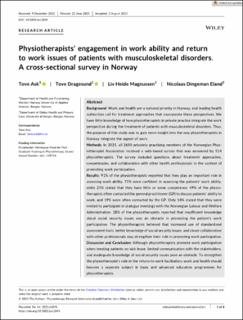| dc.contributor.author | Ask, Tove | |
| dc.contributor.author | Dragesund, Tove | |
| dc.contributor.author | Magnussen, Liv Heide | |
| dc.contributor.author | Eland, Nicolaas Dingeman | |
| dc.date.accessioned | 2024-02-01T14:01:29Z | |
| dc.date.available | 2024-02-01T14:01:29Z | |
| dc.date.created | 2023-09-06T09:24:56Z | |
| dc.date.issued | 2023 | |
| dc.identifier.issn | 1358-2267 | |
| dc.identifier.uri | https://hdl.handle.net/11250/3115099 | |
| dc.description.abstract | Background
Work and health are a national priority in Norway, and leading health authorities call for treatment approaches that incorporate these perspectives. We have little knowledge of how physiotherapists in private practice integrate the work perspective during the treatment of patients with musculoskeletal disorders. Thus, the purpose of this study was to gain more insight into the way physiotherapists in Norway integrate the aspect of work.
Methods
In 2021, all 2650 privately practising members of the Norwegian Physiotherapist Association received a web-based survey that was answered by 514 physiotherapists. The survey included questions about treatment approaches, competencies, and collaboration with other health professionals in the context of promoting work participation.
Results
91% of the physiotherapists reported that they play an important role in assessing work ability. 75% were confident in assessing the patients' work ability, while 25% stated that they have little or some competence. 49% of the physiotherapists often contacted the general practitioner (GP) to discuss patients' ability to work, and 19% were often contacted by the GP. Only 14% stated that they were invited to participate in dialogue meetings with the Norwegian Labour and Welfare Administration. 28% of the physiotherapists reported that insufficient knowledge about social security issues was an obstacle in promoting the patient's work participation. The physiotherapists believed that increased use of standardised assessment tools, better knowledge of social security issues, and closer collaboration with other professionals may strengthen their role in promoting work participation.
Discussion and Conclusion
Although physiotherapists promote work participation when treating patients on sick leave, limited communication with the stakeholders, and inadequate knowledge of social security issues pose an obstacle. To strengthen the physiotherapist's role in the return-to-work facilitation, work and health should become a separate subject in basic and advanced education programmes for physiotherapists. | en_US |
| dc.language.iso | eng | en_US |
| dc.publisher | Wiley | en_US |
| dc.rights | Navngivelse 4.0 Internasjonal | * |
| dc.rights.uri | http://creativecommons.org/licenses/by/4.0/deed.no | * |
| dc.title | Physiotherapists' engagement in work ability and return to work issues of patients with musculoskeletal disorders. A cross-sectional survey in Norway | en_US |
| dc.type | Journal article | en_US |
| dc.type | Peer reviewed | en_US |
| dc.description.version | publishedVersion | en_US |
| dc.rights.holder | Copyright 2023 The Author(s) | en_US |
| dc.source.articlenumber | e2045 | en_US |
| cristin.ispublished | true | |
| cristin.fulltext | original | |
| cristin.qualitycode | 1 | |
| dc.identifier.doi | 10.1002/pri.2045 | |
| dc.identifier.cristin | 2172805 | |
| dc.source.journal | Physiotherapy Research International | en_US |
| dc.identifier.citation | Physiotherapy Research International. 2023, 29 (1), e2045. | en_US |
| dc.source.volume | 29 | en_US |
| dc.source.issue | 1 | en_US |

